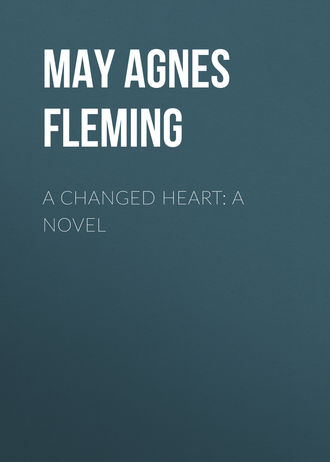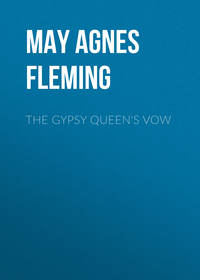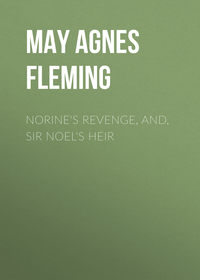 полная версия
полная версияA Changed Heart: A Novel

May Agnes Fleming
A Changed Heart: A Novel
CHAPTER I.
MISS McGREGOR AT HOME
It was a foggy night in Speckport. There was nothing uncommon in its being foggy this close May evening; but it was rather provoking and ungallant of the clerk of the weather, seeing that Miss McGregor particularly desired it to be fine. Miss Jeannette (she had been christened plain Jane, but scorned to answer to anything so unromantic) – Miss Jeannette McGregor was at home to-night to all the élite of Speckport; and as a good many of the élite owned no other conveyance than that which Nature had given them, it was particularly desirable the weather should be fine. But it wasn't fine; it was nasty and drizzly, and sultry and foggy; and sky and sea were blotted out; and the gas-lamps sprinkled through the sloppy streets of Speckport blinked feebly through the gloom; and people buttoned up to the chin and wrapped in cloaks flitted by each other like phantoms, in the pale blank of wet and fog. And half the year round that is the sort of weather they enjoy in Speckport.
You don't know Speckport! There I have the advantage of you; for I know its whole history, past, present, and – future, I was going to say, though I don't set up for a prophet; but the future of Speckport does not seem hard to foretell. The Union-jack floats over it, the State of Maine is its next-door neighbor, and fish and fog are its principal productions. It also had the honor of producing Miss McGregor, who was born one other foggy night, just two-and-twenty years previous to this "At Home," to which you and I are going presently, in a dirty little black street, which she scorns to know even by name now. Two-and-twenty years ago, Sandy McGregor worked as a day-laborer in a shipyard, at three and sixpence per day. Now, Mr. Alexander McGregor is a ship-builder, and has an income of ten thousand gold dollars per year. Not a millionaire, you know; but very well off, and very comfortable, and very contented; living in a nice house, nicely furnished, keeping horses and carriage, and very much looked up to, and very much respected in Speckport.
Speckport has its Fifth Avenue as well as New York. Not that they call it Fifth Avenue, you understand; its name is Golden Row, and the abiders therein are made of the porcelain of human clay. Great people, magnates and aristocrats to their finger-tips, scorning the pigmies who move in second and third society and have only the happiness of walking through Golden Row, never of dwelling there. The houses were not brown-stone fronts. Oh, no! there were half-a-dozen brick buildings, some pretty, little Gothic cottages, with green vines, and beehives, and bird-houses, about them, and all the rest were great painted palaces of wood. Some had green shutters, and some had not; some were painted white, and some brown, and some stone-color and drab, and they all had a glittering air of spickspan-newness about them, as if their owners had them painted every other week. And in one of these palaces Mr. McGregor lived.
You drove down Golden Row through the fog and drizzle, between the blinking lamps, and you stop at a stone-colored house with a brown hall-door, and steps going up to it. The hall is brilliant with gas, so is the drawing-room, so are the two parlors, so is the dining-room, so are the dressing rooms; and the élite of Speckport are bustling and jostling one another about, and making considerable noise, and up in the gallery the band is in full blast at the "Lancers" – for they know how to dance the Lancers in Speckport – and the young ladies dipping and bowing through the intricacies of the dance, wear their dresses just as low in the neck and as short in the sleeves as any Fifth avenue belle dare to do.
Very pretty girls they are, floating about in all the colors of the rainbow. There are no diamonds, perhaps, except glass ones; but there are gold chains and crosses, and bracelets, and lockets and things; and some of the young ladies have rings right up to the middle joint of their fingers. The young gentlemen wear rings, too, and glittering shirt-studs and bosom-pins, and are good looking and gentlemanly. While the young folks dance, the old folks play wallflower or cards, or take snuff or punch, or talk politics. All the juvenile rag-tag and bobtail of Speckport are outside, gaping up with open-mouthed admiration at the blazing front of the McGregor mansion, and swallowing the music that floats through the open windows.
Sailing along Golden Row, with an umbrella up to protect her bonnet from the fog, comes a tall lady, unprotected and alone, and "There's Miss Jo, hurrah!" yells a shrill voice; and the tall lady receives her ovation with a gratified face, and bows as she steps over the McGregor threshold. Ten minutes later, she enters the drawing-room, divested of her wrappings; and you see she is elderly and angular, and prim and precise, and withal good-natured. She is sharp at the joints and shoulder-blades, and her black silk dress is hooked up behind in the fashion of twenty years ago. She wears no crinoline, and looks about as graceful as a lamp-post; but she is fearfully and wonderfully fine, with a massive gold chain about her neck that would have made a ship's cable easily, and a cross and a locket clattering from it, and beating time to her movements on a cameo brooch the size of a dinner-plate. Eardrops, a finger-length long, dangle from her ears; cameo bracelets adorn her skinny wrists; and her hair, of which she has nothing to speak of, is worn in little corkscrew curls about her sallow face.
Miss Joanna Blake is an old maid, and looks like it; she is also an exile of Erin, and the most inveterate gossip in Speckport.
A tremendous uproar greets her as she enters the drawing-room, and she stops in considerable consternation.
In a recess near the door was a card-table, round which four elderly ladies and four elderly gentlemen sat, with a laughing crowd looking on from behind. The card-party were in a violently agitated and excited state, all screaming out together at the top of the gamut.
Miss Jo swept on in majestic silence, nodding right and left as she streamed down the apartment to where Mrs. McGregor stood, with a little knot of matrons around her – a lady as tall as Miss Jo herself, and ever so much stouter, her fat face hot and flushed, and wielding a fan ponderously, as if it were a ton weight. Mrs. McGregor, during forty years of her life, had been a good deal more familiar with scrubbing-brushes than fans; but you would not think so now, maybe, if you saw her in that purple-satin dress and gold watch, her fat hands flashing with rings, and that bewildering combination of white lace and ribbons on her head. Her voice was as loud as her style of dress, and she shook Miss Jo's hand as if it had been a pump-handle.
"And how do you do, Miss Blake, and whatever on earth kept you till this hour? I was just saying to Jeannette, a while ago, I didn't believe you were going to come at all."
"I could not help it," said Miss Jo. "Val didn't come home till late, and then I had to stop and find him his things. You know, my dear, what a trouble men are, and that Val beats them all. Has everybody come?"
"I think so; everybody but your Val and the Marshes. Maybe my lady is in one of her tantrums, and won't let Natty come at all. Jeannette is all but distracted. Natty's got lots of parts in them things they're having – tablets – no; tableaux, that's the name, and they never can get on without her. Jeannette's gone to look for Sandy to send him up to Redmon to see."
"I say, Miss Jo, how do you find yourself this evening?" exclaimed a spirited voice behind her; and Mrs. McGregor gave a little yelp of delight as she saw who it was – a young man, not more than twenty, perhaps, very good-looking, with bright gray eyes, fair hair, and a sunny smile. He was holding out a hand, small and fair as a lady's, to Miss Blake, who took it and shook it heartily.
"Jo's very well, thank you, Mr. Charles. How is your mamma this evening?"
"She was all right when I left home. Is Val here?"
"Not yet. Have you just come?"
The young gentleman nodded, and was turning away, but Mrs. McGregor recalled him.
"Isn't your mother coming, Charley?"
"No, she can't," said Charley. "The new teacher's come, and she's got to stay with her. She told me to bring her apologies."
The ladies were all animation directly. The new teacher! What was she like? When did she come? Was she young? Was she pretty? Did she seem nice?
"I didn't see her," said Charley, lounging against a sofa and flapping his gloves about.
"Didn't see her! I thought you said she was in your house?" cried Mrs. McGregor.
"So she is. I mean I didn't see her face. She had a thick vail on, and kept it down, and I left two or three minutes after she came."
"She came to Speckport in this evening's boat, then?" said Miss Jo. "What did she wear?"
Charley was bowing and smiling to a pretty girl passing on her partner's arm.
Mrs. McGregor nodded, and Charley sauntered off. The two ladies looked after him.
"What a nice young man that Charley Marsh is!" exclaimed Miss Jo, admiringly, "and so good-looking, and so steady, and so good to his mamma. You won't find many like him nowadays."
Mrs. McGregor lowered her voice to a mysterious whisper.
"Do you know, Miss Jo, they say he goes after that Cherrie Nettleby. Did you hear it?"
"Fiddlestick!" said Miss Jo, politely. "Speckport's got that story out, has it? I don't believe a word of it!"
"Here's Val!" cried Mrs. McGregor, off on a new tack; "and, my patience! what a swell he's got with him!"
Miss Jo looked round. Coming down the long room together were two young men, whose appearance created a visible sensation – one of them, preposterously tall and thin, with uncommonly long legs and arms – a veritable Shanghai – was Mr. Valentine Blake, Miss Jo's brother and sole earthly relative. He looked seven-and-twenty, was carelessly dressed, his clothes hanging about him any way – not handsome, but with a droll look of good humor about his face, and a roguish twinkle in his eyes that would have redeemed a plainer countenance.
His companion was a stranger, and it was he who created the sensation, not easy Val. Mrs. McGregor had called him a "swell," but Mrs. McGregor was not a very refined judge. He was dressed well, but not overdressed, as the slang term would imply, and he looked a thorough gentleman. A very handsome one, too, with dark curling hair, dark, bright, handsome eyes, a jetty mustache on his lip, and a flashing diamond ring on his finger. There was a certain air militaire about him that bespoke his profession, though he wore civilian's clothes, and he and Val looked about the same age. No wonder the apparition of so distinguished-looking a stranger in Mrs. McGregor's drawing-room should create a buzzing among the Speckport bon ton.
"My goodness!" cried Mrs. McGregor, all in a flutter. "Whoever can he be? He looks like a soldier, don't he?"
"There came a regiment from Halifax this morning," said Miss Jo. "Here's Val bringing him up."
Mr. Val was presenting him even while she spoke. "Captain Cavendish, Mrs. McGregor, of the – th," and then the captain was bowing profoundly; and the lady of the mansion was returning it, in a violent trepidation and tremor, not knowing in the least what she was expected to say to so distinguished a visitor. But relief was at hand. Charley Marsh was beside them with a young lady on his arm – a young lady best described by that odious word "genteel." She was not pretty; she was sandy-haired and freckled, but she was the daughter of the house, and, as such, demanding attention. Val introduced the captain directly, and Mrs. McGregor breathed freely again.
"Look here, Val!" she whispered, catching him by the button, "who is he, anyway?"
Val lowered his voice and looked round him cautiously.
"Did you ever hear of the Marquis of Carrabas, Mrs. McGregor?"
"No – yes – I don't remember. Is he an English nobleman?"
"A very great nobleman, Ma'am; famous in history as connected with the cat-trade, and Captain Cavendish is next heir to the title. Mrs. Marsh can tell you all about the Marquis; can't she, Charley?"
Charley, who was ready to burst into a fit of laughter at Mrs. McGregor's open-mouthed awe, took hold of the arm of a feeble-minded-looking young gentleman, whose freckled features, sandy hair, and general resemblance to the family, proclaimed him to be Mr. Alexander McGregor, Junior, and walked him off.
"And he came from Halifax this evening, Val?" Mrs. McGregor asked, gazing at the young Englishman in the same state of awe and delight.
"Yes," said Val, "it was there I got acquainted with him first. I met him on my way here, and thought you would not be offended at the liberty I took in fetching him along."
"Offended! My dear Val, you couldn't have pleased me better if you had been trying for a week. A Markis and a Captain in the Army! Why, it's the greatest honor, and I'm ever so much obliged to you. I am, indeed!"
"All right," said Val. "Speckport will be envious enough, I dare say, for it's not every place he'll go to, and all will want him. You'll lose Jane if you're not careful, though – see how he's talking to her."
Mrs. McGregor's eyes were dancing in her head. A dazzling vision rose before her – her daughter a Marchioness, living in a castle, dressed in satin and diamonds the year round! She could have hugged Val in her rapture; and Val reading some such idea in her beaming face, backed a little, in some alarm.
"I say, though, wasn't there to be tableaux or something?" he inquired. "When are they coming off?"
"As soon as Natty Marsh gets here; they can't get on without her."
"What keeps her?" asked Val.
"The new teacher's come to Mrs. Marsh's, Charley says, and Natty is stopping in to see her. There's the captain asking Jeannette to dance."
So he was; and Miss Jeannette, with a gratified simper, was just laying her kidded fingers inside his coat-sleeve, when her brother came breathlessly up.
"Look here, Janie! you'd better not go off dancing," was his cry, "if you mean to have those tableaux to-night. Natty's come!"
CHAPTER II.
NATHALIE
Mrs. McGregor's drawing-room was empty. Everybody had flocked into the front parlor and arranged themselves on seats there to witness the performance; that is to say, everybody who had no part in the proceedings. Most of the young people of both sexes were behind the solemn green curtain, with its row of footlights, that separated the two rooms, dressing for their parts. The old people were as much interested in the proceedings as the young people, for their sons and daughters were the actors and actresses.
Captain Cavendish and Mr. Val Blake occupied a front seat. Val had a part assigned him; but it did not come on for some time, so he was playing spectator now.
"I saw you making up to little Jane, Cavendish," Val was saying, sotto voce, for Miss Janie's mamma sat near. "Was it a case of love at first sight?"
"Miss McGregor is not very pretty," said Captain Cavendish, moderately. "Who was that young lady with the red cheeks and bright eyes I saw you speaking to, just before we came here?"
"Red cheeks and bright eyes!" repeated Val, putting on his considering-cap, "that description applies to half the girls in Speckport. What had she on?"
Captain Cavendish laughed.
"Would any one in the world but Val Blake ask such a question? She had on a pink dress, and had pink and white flowers in her hair, and looked saucy."
"Oh, I know now!" Val cried, with a flash of recollection; "that was Laura Blair, one of the nicest little girls that ever sported crinoline! Such a girl to laugh, you know!"
"She looks it! Ah! up you go!"
This apostrophe was addressed to the curtain, which was rising as he spoke. There was a general flutter, and settling in seats to look; the orchestra pealed forth and the first tableau was revealed.
It was very pretty, but very common – "Rebecca and Rowena." Miss Laura Blair was Rowena, and a tall brunette, Rebecca. The audience applauded, as in duty bound, and the curtain fell. The second was "Patience" – "Patience on a monument smiling at Grief." On a high pedestal stood Miss Laura Blair, again, draped in a white sheet, like a ghost, her hair all loose about her, and an azure girdle all over spangles clasping her waist.
At the foot of the pedestal crouched Grief, in a strange, distorted attitude of pain. The face of the performer was hidden in her hands; her black garments falling heavily around her, her hair unbound, too, her whole manner expressing despair, as fully as attitude could express it. The music seemed changing to a wail; the effect of the whole was perfect.
"What do you think of that?" said Val.
"Very good," said Captain Cavendish. "It goes considerably ahead of anything I had expected. Patience is very nice-looking girl."
"And isn't she jolly? She's dying to shout out this minute! I should think the glare of these footlights would force her eyelids open."
"Who is Grief?"
"Miss Catty Clowrie – isn't there music in that name? She makes a very good Grief – looks as if she had supped sorrow in spoonfuls."
"Is she pretty? She won't let us see her face."
"Beauty's a matter of taste," said Val, "perhaps you'll think her pretty. If you do, you will be the only one who ever thought the like. She is a nice little girl though, is Catty – the double-distilled essence of good-nature. Down goes the curtain!"
It rose next on a totally different scene, and to music solemn and sad. The stage was darkened, and made as much as possible to resemble a convent-cell. The walls were hung with religious pictures and statues, a coverless deal table held a crucifix, an open missal, and a candle which flared and guttered in the draft. On a prie-dieu before the table a figure knelt – a nun, eyes uplifted, the young face, quite colorless, raised, the hands holding her rosary, clasped in prayer. It was Evangeline – beautiful, broken-hearted Evangeline – the white face, the great dark lustrous eyes full of unspeakable woe. Fainter, sweeter and sadder the music wailed out; dimmer and dimmer paled the lights; all hushed their breathing to watch. The kneeling figure never moved, the face looked deadly pale by the flickering candle-gleam, and slowly the curtain began to descend. It was down; the tableau was over; the music closed, but for a second or two not a sound was to be heard. Then a tumult of applause broke out rapturously, and "Encore, encore!" twenty voices cried, in an ecstasy.
Captain Cavendish turned to Val with an enthusiastic face.
"By George, Blake! what a beautiful girl! Evangeline herself never was half so lovely. Who is she?"
"That's Natty," said Val, with composure. "Charley Marsh's sister."
"I never saw a lovelier face in all my life! Blake, you must give me an introduction as soon as these tableaux are over."
"All right! But you needn't fall in love with her – it's of no use."
"Why isn't it?"
"Because the cantankerous old toad who owns her will never let her get married."
"Do you mean her mother?"
"No, I don't, she doesn't live with her mother. And, besides, she has no room in her heart for any one but Charley. She idolizes him!"
"Happy fellow! That Evangeline was perfect. I never saw anything more exquisite."
"I don't believe Longfellow's Evangeline was half as good-looking as Natty," said Val. "Oh! there she is again!"
Val stopped talking. The curtain had arisen on an old scene – "Rebecca at the well." Evangeline had transformed herself into a Jewish maiden in an incredibly short space of time, and stood with her pitcher on her shoulder, looking down on Eleazer at her feet. Sandy McGregor was Eleazer, and a sorry Jew he made, but nobody except his mother looked at him. Like a young queen Rebecca stood, her eyes fixed on the bracelets and rings, her hair falling in a shower of golden bronze ripples over her bare white shoulders. One would have expected black hair with those luminous dark eyes, but no ebon tresses could have been half so magnificent as that waving mass of darkened gold.
"Nice hair, isn't it?" whispered Val. "Natty's proud of her hair and her voice beyond anything. You ought to hear her sing!"
"She sings well?" Captain Cavendish asked, his eyes fixed as if fascinated on the beautiful face.
"Like another Jenny Lind! She leads the choir up there in the cathedral, and plays the organ besides."
Captain Cavendish had a pretty pink half-blown rose in his button-hole. He took it out and flung it at her feet as the curtain was going down. He had time to see her bright dark eye turn upon it, then with a little pleased smile over the spectators in quest of the donor, and then that envious green curtain hid all again.
"Very neat and appropriate," criticised Val. "You're not going to wait for the introduction to begin your love-passage, I see, Captain Cavendish."
The captain laughed.
"Nothing like taking time by the forelock, my dear fellow. I will never be able to thank you sufficiently for bringing me here to-night!"
"You don't say so!" exclaimed Val, opening his eyes, "you never mean to say you're in love already, do you?"
"It's something very like it, then. Where are you going?"
"Behind the scenes. The next is 'Jack and the Beanstalk,' and they want me for the beanstalk," said Val, complacently, as his long legs strode over the carpet on his way to the back parlor.
There were ever so many tableaux after that – Captain Cavendish, impatient and fidgety, wondered if they would ever end. Perhaps you don't believe in love at first sight, dear reader mine; perhaps I don't myself; but Captain Cavendish, of Her Most Gracious Majesty's – th Regiment of Artillery did, and had fallen in love at first sight at least a dozen times within quarter that number of years.
Captain Cavendish had to exercise the virtue of patience for another half-hour, and then the end came.
In flocked the performers, in laughing commotion, to find themselves surrounded by the rest, and showered with congratulations. Captain Cavendish stood apart, leaning against a fauteuil, stroking his mustache thoughtfully, and looking on. Looking on one face and form only of all the dozens before him; a form tall, taller than the average height, slender, graceful, and girlish as became its owner's eighteen years; and a face inexpressibly lovely in the garish gaslight. There was nobility as well as beauty in that classic profile, that broad brow; fire in those laughing blue eyes, so dark that you nearly mistook them for black; resolution in those molded lips, the sweetest that ever were kissed. The hair alone of Nathalie Marsh would have made a plain face pretty; it hung loose over her shoulders as it had done on the stage, reaching to her waist, a cloud of spun gold, half waves, half curls, half yellow ripples.
Few could have worn this hair like that, but it was eminently becoming to Nathalie, whom everything became. Her dress was of rose color, of a tint just deeper than the rose color in her cheeks, thin and flouting, and she was entirely without ornament. A half-blown rose was fastened in the snowy lace of her corsage, a rose that had decked the buttonhole of Captain Cavendish half an hour before.
Val espied him at last and came over. "Are you making a tableau of yourself," he asked, "for a certain pair of bright eyes to admire? I saw them wandering curiously this way two or three times since we came in."
"Whose were they?"
"Miss Nathalie Marsh's. Come and be introduced."
"But she is surrounded."
"Never mind, they'll make way for you. Stand out of the way, Sandy. Lo! the conquering hero comes! Miss Marsh, let me present Captain Cavendish, of the – th; Miss Marsh, Captain Cavendish."
The music at that instant struck up a delicious waltz. Mr. Val Blake, without ceremony, laid hold of the nearest young lady he could grab.
"Come, Catty! let's take a twist or two. That's it, Cavendish! follow in our wake!"
For Captain Cavendish, having asked Miss Marsh to waltz, was leading her off, and received the encouraging nod of Val with an amused smile.
"What a character he is!" he said, looking after Val, spinning around with considerable more energy than grace; "the most unceremonious and best-natured fellow in existence."






